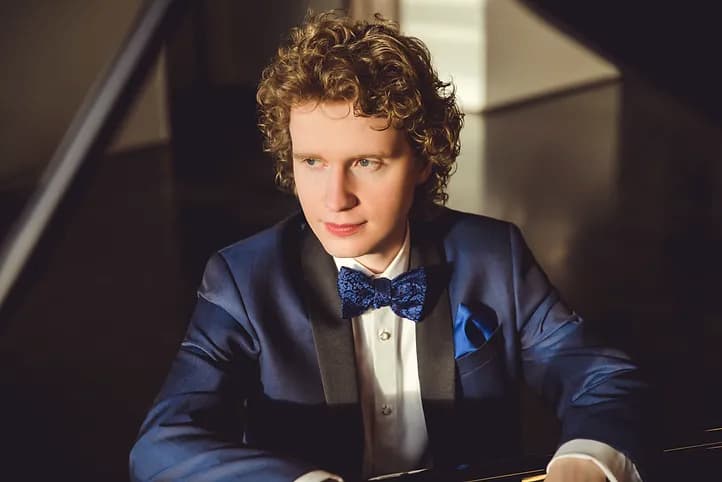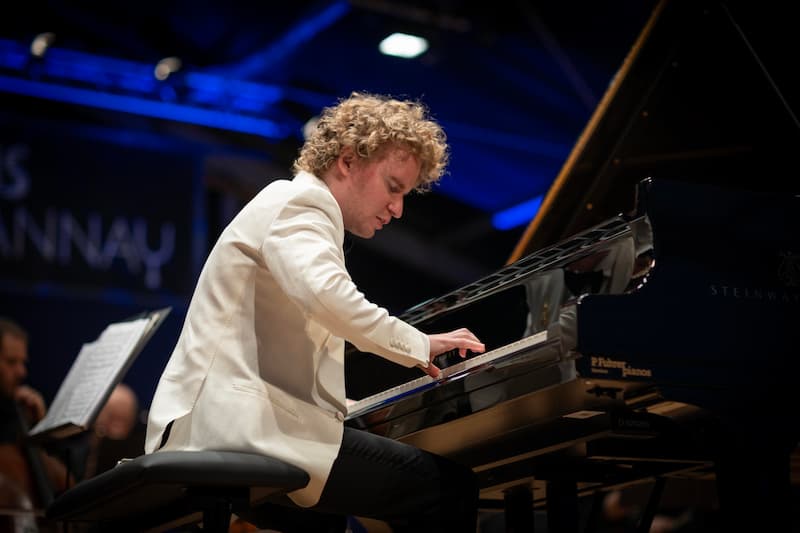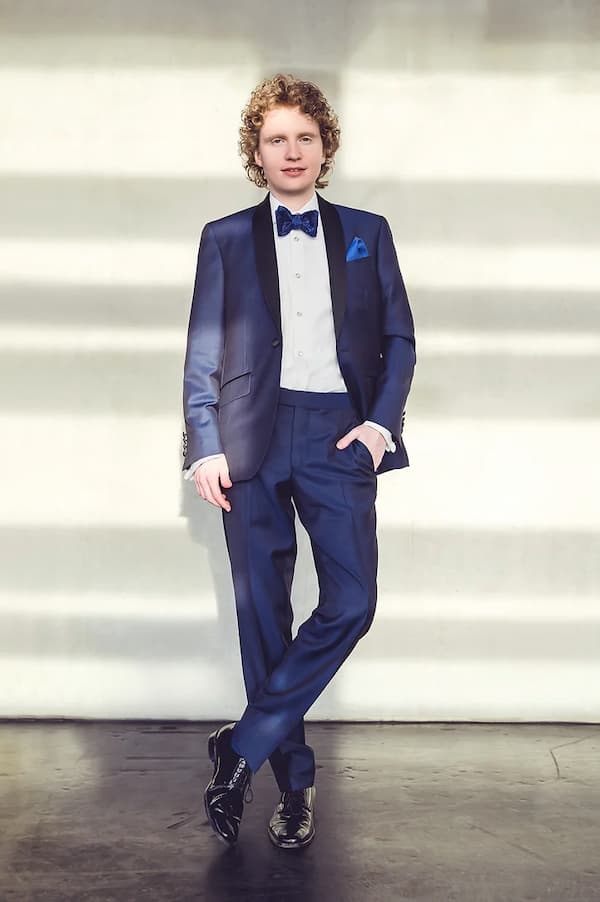‘Music Can Connect Us All, In Unimaginable Ways’

Nikolay Khozyainov © nikolaykhozyainov.com
Described by the New York Times as a musician of ‘stunning virtuosity and prodigious technique’, Russian pianist Nikolay Khozyainov has built up a reputation as a musician of unique musical sensitivity and insight. Along with solo performances at venues including Carnegie Hall, Wigmore Hall, Lincoln Center, the Théâtre des Champs-Élysées, Tokyo’s Suntory Hall, and the Sydney Opera House, Nikolay has a similarly global list of orchestral collaborations, having appeared with the Russian State Symphony Orchestra, RTE National Symphony Orchestra of Ireland, Czech National Symphony Orchestra, and the Sydney Symphony, among many others.
In 2022, Nikolay was commissioned by the UN to write a solo piano piece, the premiere of which was given in the Human Rights Hall of Geneva’s UN buildings. The new work, Petals of Peace rounds off Nikolay’s latest album, Monument to Beethoven, featuring works by Schumann, Liszt, and Mendelssohn, which were originally written to raise funds for a public monument of Beethoven in Bonn, Germany – a statue which was erected in 1845 and is still standing today.
Following his concert in Geneva, Nikolay was awarded the UN’s Gold Medal for Peace. He has also been honoured by heads of state in Spain and Japan – testament to his work and belief that music can and should be a force for peace in the world.
Schumann Etudes in Variation Form on a Theme of Beethoven, WoO 31 – Nikolay Khozyainov
How did the Monument to Beethoven project come about?
In the 1840s, there was still no monument to Beethoven anywhere in the world, and Liszt felt very moved by that fact. He wanted to present a monument to the great master whom he and many other composers admired, like Schumann and Mendelssohn.
Liszt started to collect funds for the project, and in the end, he actually paid for the majority of the costs himself, out of his own pocket, and it was all thanks to his art and his music, his relentless concerts.
I have to say I’ve always admired Liszt. For me, he has always been, since my childhood, the definition of a ‘complete’ musician. He was a great pianist, he was a great composer and conductor, and he also did a lot of philanthropy. He helped other musicians, other composers – he launched their careers, so to say.
Liszt’s personality has always really appealed to me. I wanted to present this CD, this programme, to show the legacy of Liszt as well, not only as a composer but as somebody who did a lot for music.
He loved being with the audience, something that I can connect to. I also love being with people, not only on stage but also after the concert, offstage: to talk to them, to share impressions and to share in the beauty of the music.
I believe not just in playing the piano but also that music can connect us all in unimaginable ways, in ways that other things will not.
How did it feel to write and premiere your piece, Petals of Peace, at the UN?

Nikolay Khozyainov with Kammerorchester Basel at the Variations Musicales de Tannay Festival in Switzerland © nikolaykhozyainov.com
That was an amazing project. For me, peace is like a mirage, a beautiful vision. It’s something that we can almost touch – it’s a feeling, sometimes very fleeting.
Of course, giving the world premiere of this piece at the UN was a very special moment in front of dignitaries and politicians and representatives of every country. It hosts 193 countries, almost the whole world.
Did performing there feel different to a ‘normal’ concert?
Yes, absolutely. The tension of the moment was incredible. You could feel that something important was happening in that moment. The Human Rights Hall of the UN (where the premiere took place) is absolutely beautiful, and the event was very special. It was very memorable.
The title of my piece isn’t descriptive of anything in particular. It’s more of a feeling that I felt inside of me that I expressed in music and also in the title at the same time.
Looking back to your childhood, you discovered music in a local shop. Were your family supportive when you decided to start playing?
I don’t have musicians in my family at all. My mother is a paediatrician and my grandfather was a scientist, so it’s a totally different background. That music shop was the key to me discovering the beauty of music.
I heard music in the shop and luckily for me, it was Beethoven, Chopin, Tchaikovsky… As soon as I heard it, I was so fascinated that I started spending all my time in that shop. After a while, I went up to my mother and said, ‘I want to play.’ I wanted to make that beauty by myself.
She at first was a bit apprehensive, but I insisted a lot, and she brought me to the kindergarten where she worked as a paediatrician because there was a little piano there. That’s where I started playing the music that I heard in the shop.
I had the support of my mother, and of my grandfather also. For him, he didn’t know much about music, but what was important was that I had a desire to do something by myself, so he gave me all the support that he could.
Who inspired you growing up, and who inspires you today?

© nikolaykhozyainov.com
There have been two musical inspirations for me, two musical personalities. One I already mentioned – Franz Liszt – and the second was Rachmaninoff. For me, he was also this kind of ‘complete’ musician. He played, he was an amazing pianist, an amazing composer and also a conductor.
This ‘completeness’ attracts me a lot. I find that when a musician is only focused on their instrument, they can be amazing, but a musician who has a bigger vision of music in general has something more. It not only enriches you, but it’s absolutely crucial.
Is that something you aspire to in your own career?
Yes, that’s right. I started conducting when I was very little. When I was seven years old, with the help of my mother, I came to a conducting teacher, Vladimir Bogorad, who was a conductor at the Bolshoi Theatre.
He looked at me, and he was surprised since I was just a little boy. He did a quiz with me – he asked how many symphonies Beethoven had written, and I answered him. He then asked me to sing whatever symphonies I knew – and I sang all of them! He was very impressed and said, ‘Ok, we start tomorrow.’
We spent an amazing time together. With Vladimir, I studied all the symphonies of Haydn, Mozart, Beethoven, and Russian music, German music… it was really an amazing time.
You speak 11 languages. What are they, and where does your interest in languages come from?
I speak Russian, Polish, German, French, English, Spanish, Italian, Hebrew, Arabic, Japanese, and Chinese. There is always a reason why I learned each language and the reason usually is literature. I want to know the people better, and the language is kind of a key that opens that door to know another culture the best way possible.
I read a lot, including a lot of poetry, and poetry only makes sense in the original language. Poetry has a lot to do with the sounds of the words, not just the meaning. In that way, poetry is like a sister to music. There is so much music in poetry and poetry in music, so they go hand in hand.
That’s why I started to learn Japanese, for example. I wanted to read Japanese poetry – I was fascinated by it, but I could tell that the translation didn’t do it justice, so I started learning. I also travel to those countries, I have friends from there, and I get the opportunity to practice.
Chopin Waltz in A flat major, Op. 42 – Nikolay Khozyainov
How does this feed into your work and identity as a musician?
My way of thinking is that I’ve always loved to go to the source, the deepest way possible. In music, when I study a piece, I study every available source: the manuscript, of course, and the first editions, where the composer still makes some corrections.
I study all that, every letter that is available written by the composer… I study everything surrounding the creation of the piece and then, starting from there, that’s how I create my interpretation.
Obviously, it’s me, the artist, on stage, but I want to know everything that is available. That’s why I go to libraries, I spend time studying the manuscripts one-on-one. If you hold a manuscript of Chopin in your hands, you really feel like you’re in front of the great master who passed away almost two hundred years ago. It’s an amazing feeling.
In Warsaw, there is a manuscript of the last piece Chopin wrote, a Mazurka. He wrote it in Paris, at the Place Vendôme, and I gave a concert there once, playing that Mazurka. Holding that piece was an incredibly emotional moment for me. You could see how his writing was broken. You could feel almost physically how sick he was and how he was suffering, how much he was changing. After seeing that you never play the same way again.
For more of the best in classical music, sign up for our E-Newsletter





An outstanding interpreter, composer, and HUMAN being in communion with MUSIC AND ITS SPIRITUAL REALITY…. Which his virtuosity helps bring down to the realm of our ears, therefore HEART ! Remember, not per chance is (there an acupuncture meridian that connects ear and heart…. Not for nothing are « secrets » best flustered into the ear…. And therefore music is the bridge to the divine… I mean classical music and heartfelt modern compositions…